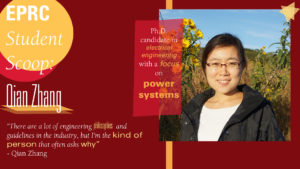
EPRC Student Scoop: Unstoppable Engineer, Qian Zhang
An electrical engineer at heart, Qian Zhang is never one to stop at a simple answer, always asking why.
With a bachelor’s degree in electrical engineering and automation from Beihang University, Beijing, China, in 2011 and a master’s degree in electrical engineering at the University of Minnesota in 2013, Zhang had plenty of knowledge in the electrical engineering field. After her education, she worked in the power industry for a year and a half as a power system protection engineer for HDR Engineering Inc., a consulting company in Minneapolis. But while she had a secure job and was learning a lot, she was ready to still dive deeper. And that is what led her to Iowa State University.
“While working as a power system engineer, I felt my inner desire to pursue a Ph.D. degree, to obtain a broader view as well as a deeper understanding of how power systems are operated,” Zhang said. “There are a lot of engineering philosophies and guidelines in the industry, but I’m the kind of person that often asks ‘why.’ And that motivated me to pursue a Ph.D.”
In Zhang’s pursuit of a Ph.D. program, she was drawn to Iowa State for its power program in the Electric Power Research Center (EPRC). In Spring 2015, Zhang joined Iowa State’s Ph.D. electrical engineering program in the Department of Electrical and Computer Engineering at Iowa State focusing on power systems.
“There are many subfields within the power area, but I’m specifically interested in power systems because I think it is an amazing area with lots of exciting research topics due to the massive renewables integration to mitigate climate change,” Zhang said. “Iowa State has been a well-known university with strong power programs for a long time, especially in terms of power systems. That’s why I was interested in pursuing my Ph.D. at Iowa State. So I contacted my advisor Dr. James McCalley and he happened to be looking for Ph.D. students at that time with an interesting project. And that’s how I joined, in Spring 2015, and I have always been very grateful to that opportunity he gave me.”
Within the past five years, Zhang has been working on a wide variety of projects — two with electric utilities, one with Southern California Edison and the other with Xcel Energy. Her third project was a specific EPRC project, investigating the opportunities and benefits of voltage source converter based high voltage direct current technology (VSC-HVDC). This third project is also the project that inspired her Ph.D. thesis.
All of Zhang’s work involves solving real-world problems, and she says that may be what drives her to always keep learning and developing new and more efficient ways to help the electrical world.
“One of the most important things as power engineers is to ‘keep the lights on,’” Zhang said. “People may take the continuity of power supply for granted. However, there are a lot of efforts made to achieve that, both in the research community and in the industry. As a power system researcher, my research projects generally focus on dynamics and stability of power systems, especially for a high renewable future.”
Zhang’s research saves systems from more disastrous blackouts and helps climate change by improving the reliability of power systems. She designs control methods for multiterminal VSC-HVDC systems, to improve the dynamic performance and the reliability of combined AC/DC systems. Moreover, she implemented the designed controls to a continental North American power grid with HVDC overlay, demonstrating their effectiveness on practical large scale systems. Her methods are of high value to the power system community for practical power system planning.
Zhang’s two advisors are Dr. James D. McCalley and Dr. Venkataramana Ajjarapu, and she says that although they are very busy, she interacts with them both frequently.
“My advisors are both very nice and caring for students,” Zhang said. “Professors are always quite busy, but whenever I have doubts and would like to discuss with them, they are always there, managing to find time to meet with me. When I meet obstacles, they always encourage me and give me confidence, which really helps me through the toughest times of my Ph.D. journey. They give me research guidance based on their rich knowledge and experience, but also respect my ideas. With their guidance, I gradually am picking up the philosophy of how to do research and getting closer to being a good researcher.”
Zhang has learned a lot of things throughout her experience at Iowa State. But above all, she has strengthened her passion for digging deeper, and always asking why.
“The most important thing I learned is perseverance,” Zhang said. “As a Ph.D. student, I went through a lot of ups and downs in my journey. Many times I did not see a way out initially, but with perseverance, I managed to come up with solutions for each obstacle I met. When you look back, you would appreciate yourself for not giving up. And I think this is true for many other things in our lives, not just for academics. So I really appreciate my experience at Iowa State.”